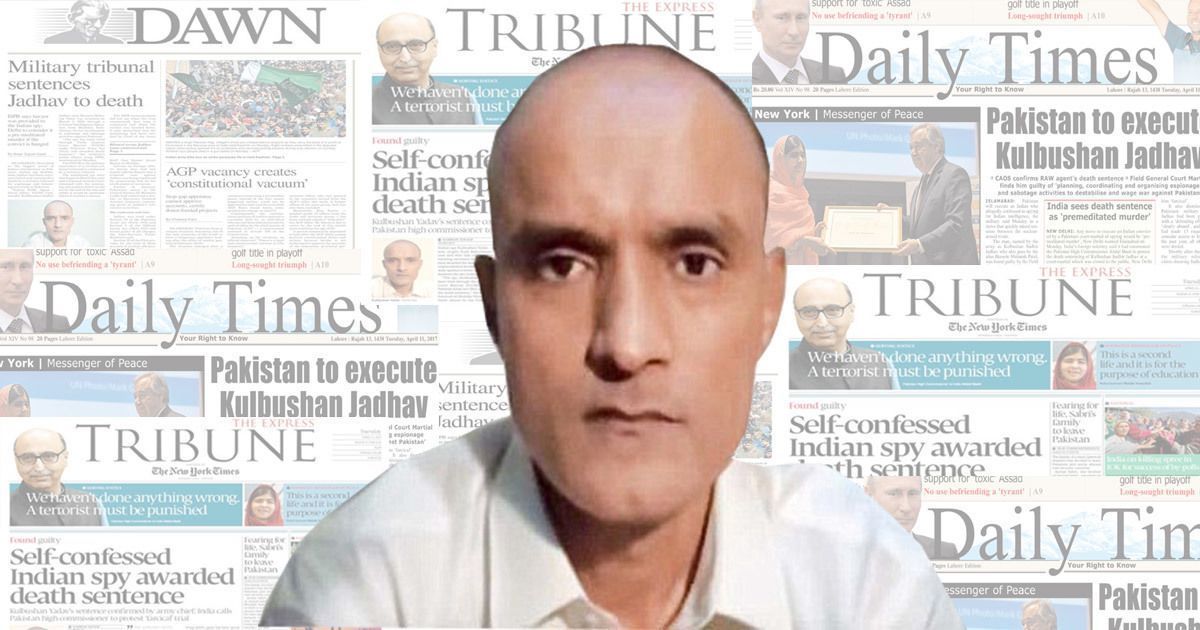Feature
India urges ICJ to annul Kulbhushan Jadhav death sentence given by Pakistani military

The Hague: India on Monday urged the International Court of Justice (ICJ) to annul Kulbhushan Jadhav’s death sentence by a Pakistani military court and order his immediate release, saying the verdict based on a “farcical case” hopelessly fails to satisfy even the minimum standards of due process.
Jadhav, a retired Indian Navy officer, was sentenced to death by the military court on charges of “espionage and terrorism” after a closed trial in April 2017. His sentencing evoked a sharp reaction in India.
India moved the ICJ in May the same year for the “egregious violation” of the provisions of the Vienna Convention by Pakistan by repeatedly denying New Delhi consular access to the 48-year-old Indian national.
“Military courts of Pakistan cannot command the confidence of this court and should not be sanctify by a direction to them to review and re-consider the case. India seeks annulment of Jadhav’s conviction, and directions that he be released forthwith,” said Harish Salve, the lawyer representing India and Jadhav in the case at the ICJ.
The four-day trial opened Monday at the ICJ headquarters here amidst heightened tensions between India and Pakistan following one of the worst terror attacks in Jammu and Kashmir by Pakistan-based Jaish-e-Mohammad terror group that killed at least 41 CRPF soldiers.
“India seeks relief in declaring that the trial by the military court in Pakistan hopelessly fails to satisfy even the minimum standards of due process… and should be declared unlawful,” said Salve, the former solicitor general of India.
Noting that military courts in Pakistan are not independent, Salve said the working of such courts have been censured by the European Parliament.
“A foreign detainee has the right to life, the right to a fair trial and an impartial judiciary. However, Pakistan has sentenced 161 civilians to death in their military courts in opaque proceedings in the last two years,” Salve said.
He urged the ICJ to grant relief to Jadhav in the backdrop of fact that his trial has been done by a military court.
“Considering the trauma he (Jadhav) has been subjected to over the past three years, it would be in the interest of justice of making human rights a reality, to direct his release,” Salve said on the first day of the hearing.
Pakistan claims that its security forces arrested Jadhav from restive Balochistan province on March 3, 2016 after he reportedly entered from Iran. However, India maintains that Jadhav was kidnapped from Iran where he had business interests after retiring from the Navy.
Making submissions in the ICJ that lasted nearly three hours, Salve said Pakistan’s conduct doesn’t inspire confidence that Jadhav can get justice there.
“Pakistan has in custody an Indian national who has been publicly portrayed to be a terrorist and Indian agent creating unrest in Balochistan…,” he said, adding that there is no doubt that Pakistan was using this as a propaganda tool.
No “credible evidence” was provided by Pakistan to show his involvement in any act of terrorism and Jadhav’s purported confession clearly appeared to be “coerced”, Salve said.
Noting that under the international law Pakistan was bound to grant consular access to Jadhav without delay, Salve said India sent 13 reminders to Pakistan for consular access to Jadhav, but Islamabad is yet to accede.
India demands ICJ to annul, immediate release of Kulbhushan Jadhav given by Pakistan:
“Pakistan knowingly, brazenly and willingly” violated the international law, Salve told the judges.
He said Jadhav’s continued custody without consular access should be declared “unlawful.”
Salve said Pakistan filed the FIR almost a month after the arrest of Jadhav. He said Pakistan was embarrassed to disclose charges against Jadhav.
Salve read out the various sections and articles of the Vienna Convention under which foreign prisoners fall.
“The Vienna Convention is a powerful tool that ensures the facility of consular access to foreign nationals who have been put on trial in foreign trial,” he said.
“Article 36 of the Vienna Convention says that a country must be informed about the detention of its citizens but Pakistan did not inform India about his arrest.”
Without consular access, he said, “India has no information on what happened to Kulbhushan Jadhav in Pakistan.”
“India and Pakistan have a bilateral agreement on consular access,” he said. “Bilateral treaties cannot modify Article 36 of Vienna Convention. It could only supplement it.”
Pakistan should have provided a substantial explanation for why it needed three months for providing consular access, upon which it could have claimed that it has complied with treaty obligation, Salve said.
Salve argued that Pakistan did not uphold the Article 36 of the Vienna Convention that states consular access applies all nationals, regardless of espionage claims in Jadhav’s case.
“This quite plainly, is an egregious violation of Pakistan’s obligations under Article 36 of the Vienna Convention,” said Salve.
He said Pakistan offered to allow Jadhav’s family to visit him, the terms were agreed and the meeting was held on 25 December, 2017.
“India was dismayed at the manner the meeting with Jadhav’s family was conducted and wrote a letter on 27 December marking its protest,” he said.
Pakistan didn’t send any details of the probe conducted by the Joint Investigation Team before informing the Indian side about the death sentence handed over to him. Jadhav did not get any lawyer during his trial, he added.
The ICJ adjourned the hearing till Tuesday when Pakistan will get the opportunity to present its case.
Entertainment
Meghalaya Reserves Legalized Gambling and Sports Betting for Tourists

The State Scores Extra High on Gaming-Friendly Industry Index
Meghalaya scored 92.85 out of 100 possible points in a Gaming Industry Index and proved to be India’s most gaming-friendly state following its recent profound legislation changes over the field allowing land-based and online gaming, including games of chance, under a licensing regime.
The index by the UK India Business Council (UKIBC) uses a scale of 0 to 100 to measure the level of legalisation on gambling and betting achieved by a state based on the scores over a set of seven different games – lottery, horse racing, betting on sports, poker, rummy, casino and fantasy sports
Starting from February last year, Meghalaya became the third state in India’s northeast to legalise gambling and betting after Sikkim and Nagaland. After consultations with the UKIBC, the state proceeded with the adoption of the Meghalaya Regulation of Gaming Act, 2021 and the nullification of the Meghalaya Prevention of Gambling Act, 1970. Subsequently in December, the Meghalaya Regulation of Gaming Rules, 2021 were notified and came into force.
All for the Tourists
The move to legalise and license various forms of offline and online betting and gambling in Meghalaya is aimed at boosting tourism and creating jobs, and altogether raising taxation revenues for the northeastern state. At the same time, the opportunities to bet and gamble legally will be reserved only for tourists and visitors.
“We came out with a Gaming Act and subsequently framed the Regulation of Gaming Rules, 2021. The government will accordingly issue licenses to operate games of skill and chance, both online and offline,” said James P. K. Sangma, Meghalaya State Law and Taxation Minister speaking in the capital city of Shillong. “But the legalized gambling and gaming will only be for tourists and not residents of Meghalaya,” he continued.
To be allowed to play, tourists and people visiting the state for work or business purposes will have to prove their non-resident status by presenting appropriate documents, in a process similar to a bank KYC (Know Your Customer) procedure.
Meghalaya Reaches Out to a Vast Market
With 140 millions of people in India estimated to bet regularly on sports, and a total of 370 million desi bettors around prominent sporting events, as per data from one of the latest reports by Esse N Videri, Meghalaya is set to reach out and take a piece of a vast market.
Estimates on the financial value of India’s sports betting market, combined across all types of offline channels and online sports and cricket predictions and betting platforms, speak about amounts between $130 and $150 billion (roughly between ₹9.7 and ₹11.5 lakh crore).
Andhra Pradesh, Telangana and Delhi are shown to deliver the highest number of bettors and Meghalaya can count on substantial tourists flow from their betting circles. The sports betting communities of Karnataka, Maharashtra, Uttar Pradesh and Haryana are also not to be underestimated.
Among the sports, cricket is most popular, registering 68 percent of the total bet count analyzed by Esse N Videri. Football takes second position with 11 percent of the bets, followed by betting on FIFA at 7 percent and on eCricket at 5 percent. The last position in the Top 5 of popular sports for betting in India is taken by tennis with 3 percent of the bet count.
Local Citizens will Still have Their Teer Betting
Meghalaya residents will still be permitted to participate in teer betting over arrow-shooting results. Teer is a traditional method of gambling, somewhat similar to a lottery draw, and held under the rules of the Meghalaya Regulation of the Game of Arrow Shooting and the Sale of Teer Tickets Act, 2018.
Teer includes bettors wagering on the number of arrows that reach the target which is placed about 50 meters away from a team of 20 archers positioned in a semicircle.
The archers shoot volleys of arrows at the target for ten minutes, and players place their bets choosing a number between 0 and 99 trying to guess the last two digits of the number of arrows that successfully pierce the target.
If, for example, the number of hits is 256, anyone who has bet on 56 wins an amount eight times bigger than their wager.























